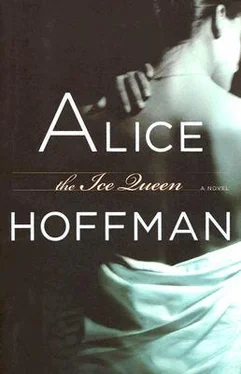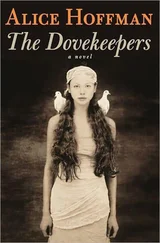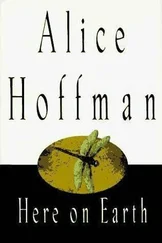I let the water in the bath drain, and after I dressed I went outside. It was still hot. Too hot to breathe. The wind rattled, knocked things about. The palm fronds smacked against one another. Giselle followed me out and went to sit beside the hedge, waiting for the moles that sometimes wandered onto our lawn. I wondered if this would ever feel like home. If anything ever would. I wondered if this book was my brother’s defining secret, or just a small part of who he truly was.
Far away, there was thunder, a common enough occurrence in Florida, something most people ignored. I thought of Ned surrounded by a whirlwind, like the nucleus of an atom, trapped within itself. I thought of him walking into the Orlon Public Library looking for answers, still trying to understand what we did wrong. I wanted to telephone my brother and say, Tell me the truth. Do you believe a wish can kill? Do you believe we could have changed something that night, stopped the ice from falling, stopped our mother from getting in her car? If we’d run along the road till she turned around, woken from sleep and called the police with a premonition, would she still be alive? Tell me, brother, could we have done anything differently, you and I?
What is the difference between love and obsession? Didn’t both make you stay up all night, wandering the streets, a victim of your own imagination, your own heartbeat? Didn’t you fall into both, headfirst into quicksand? Wasn’t every man in love a fool and every woman a slave?
Love was like rain: it turned to ice, or it disappeared. Now you saw it, now you couldn’t find it no matter how hard you might search. Love evaporated; obsession was realer; it hurt, like a pin in your bottom, a stone in your shoe. It didn’t go away in the blink of an eye. A morning phone call filled with regret. A letter that said, Dear you, good-bye from me . Obsession tasted like something familiar. Something you’d known your whole life. It settled and lurked; it stayed with you.
I tried to define what was happening to me. I had decided never again to drive out to the Jones orchard, and yet I could see the map that led there simply by closing my eyes. I often had lunch with Renny in the school cafeteria, but despite the salad in front of me, all I could taste was an orange, the sweet kind with the reddish rind, the sort that to me looked like ice. My mouth puckered. My heart raced. I thought of all those silly lovelorn girls I’d known in high school, and for once felt a bit of compassion. Foolish creatures. Foolish me. At night I dreamed of things that were dangerous: snakes, stepladders, horses’ heads nailed to the wall. When it rained I stood by the window, looking for lightning. There were music students who lived down the street and when they practiced in the evenings, the sound of the oboe made me weep, the piano forced me to cover my ears. I suppose I had begun to feel something, just an itch. Just a sting. That was the problem. I was such a novice I didn’t understand what it meant when I couldn’t sleep, couldn’t eat, when my racing thoughts were too often of Lazarus Jones.
Since I didn’t believe in love, I soon enough defined my state as a delusionary preoccupation. Obsession. An emotion that should be tied up and taken out with the trash, replaced by more serious, less affecting thoughts. I turned to work, or what little there was of it at the library. But even there my obsessive nature took over. I pretended to be cheerfully busy, entering information into the computer, dusting and ordering the shelves, but in fact my new, rather prurient interest was looking up people’s reading habits. It was disgusting, really. An invasion of privacy, a petty crime of the soul. I’d begun by looking up my brother’s card; now I couldn’t seem to stop. That was my nature, to take something bad and make it worse.
I looked up which novels my physical therapist most enjoyed, thick nineteenth-century tomes in which problems weren’t easily solved with exercise and diet. I saw that Matt Acres, owner of the hardware store, preferred biographies of adventurers, men who left behind their safe and settled lives. Dr. Wyman’s teenaged daughter, who was home for the summer from private school in New England, had read all of D. H. Lawrence. People in the Orlon Home for the Aged most often requested travel books for places they would surely never see: Egypt, Paris, Venice, Mexico. My mailman was reading poetry; no wonder what little mail I received was crumpled and stained. The griddle cook at the diner, who made a terrible omelet and even worse blueberry pancakes, read Kafka, in German.
If Frances York had known what I was doing, I would have been fired on the spot. What people read revealed so much about them that she considered our card catalog a treasure house of privileged secrets; each card contained the map of an individual’s soul. I knew Frances’s philosophy. It was not our job to monitor the books our patrons withdrew any more than it was our duty to alter their reading habits. I liked Frances and respected her, but I wondered if she would have hired me in the first place had she known who I really was. I was poison long before I’d started snooping around. Would she have felt safe with a person who knew more about the effects of arsenic than she did about the Dewey decimal system? A death addict and a thief who didn’t know wrong from right, white from red? At least now I’d had Peggy come by to help color-code my clothes; I knew enough to wear white blouses and black skirts to work and to leave my red clothes at home. But I was still me, hidden by sensible shoes, by skirts past my knee and button-down blouses.
Thankfully, Frances had no reason to suspect any of this. I was a model employee: polite to our patrons, cheerfully running books out to those who were housebound or in the hospital. I even made a weekly trip to the home for the aged with a box of travel books. Could anyone have discerned I was not to be trusted? Not for a second. Well, maybe those mothers from the nursery group, they seemed to know, but I wasn’t counting them. I avoided the children’s section as a matter of fact. The bright illustrations, the rhymes, the high hopes, all made me nervous. Child patrons always wanted something: directions to the bathroom, a drink of water, a sequel to a book that doesn’t have one.
The children’s section was where the tall windows were, and the sunlight filtering through in pale streams revealed how filthy the shelves were. There were dust motes everywhere. I ventured into that section one morning with a mop and a sponge. At least it was a school day, and there were no children around. Only me.
By accident, I found the book my brother had taken out.
Or perhaps there were no accidents; perhaps I saw the book out of the corner of my eye, and my brain processed the discovery in some deep place I couldn’t reach. However it happened, I turned and there it was, not put back properly, askew on the shelf. It was an old edition of Grimm’s, black with silver lettering. The pages smelled watery; when I held the book up to my nose I sneezed. Tears in my eyes. So what? I just happened to pick it up. I just happened to sit on the floor cross-legged and thumb through the pages.
One story in particular had clearly been a favorite, perhaps of my brother, with dog-eared pages and a coffee stain or two. It was “Godfather Death,” one of the stories I’d hated and had always passed by. In this tale, whenever Death stands at the feet of an ill person, that person belongs to him. To trick Death, a good doctor, the kind hero, turns the ill person around so that Death is at the head and therefore cannot take him. Fairy-tale logic can be intractable or fluid, and the hero never knows which it is. Especially if the hero is a rational man. This one is. One more time and I’ll take you instead,
Читать дальше












